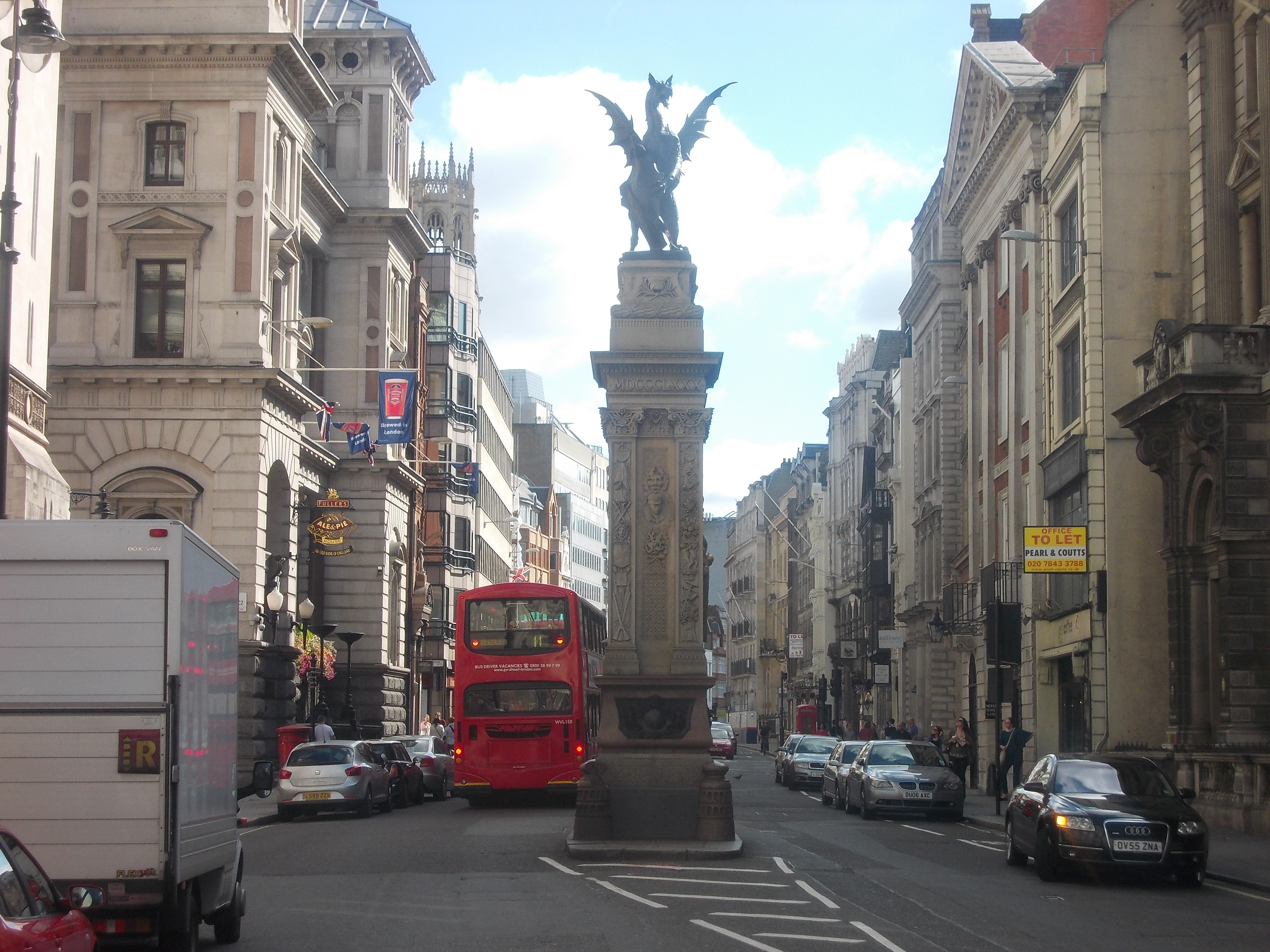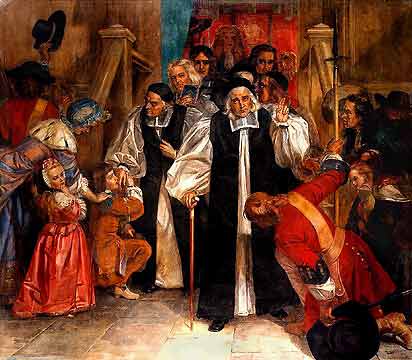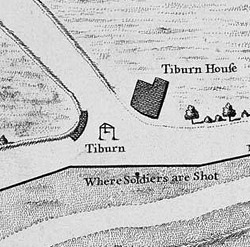|
Sir John Friend
Sir John Friend or Freind (died 1696), was an English conspirator. Life Friend was the eldest son of John Friend, a brewer, who resided in the precinct of St. Katharine's, near the Tower of London. He followed his father's business. He built the "stately brewhouse" called the Phœnix in the Minories, and amassed considerable wealth. For a while he maintained a fine country residence at Hackney. In 1683 Friend was appointed a commissioner of excise. As Colonel of the Honourable Artillery Company (HAC), Friend, on occasion of their feast, 26 June 1684, had the honour of entertaining James, Duke of York and Prince George of Denmark at a banquet in the Artillery Ground. Though a Protestant, he remained a faithful adherent of James II, by whom he was knighted 3 August 1685. After the Glorious Revolution Friend was expelled from the HAC at a meeting held in February 1689–90, and lost his seat at the board of excise. However, by a treasury order dated 18 December 1690, he was rel ... [...More Info...] [...Related Items...] OR: [Wikipedia] [Google] [Baidu] |
Honourable Artillery Company
The Honourable Artillery Company (HAC) is a reserve regiment in the British Army. Incorporated by royal charter in 1537 by King Henry VIII, it is the oldest regiment in the British Army and is considered the second-oldest military unit in the world. Today, it is also a charity whose purpose is to attend to the "better defence of the realm", primarily through supporting the HAC regiment and a detachment of City of London Special Constabulary. The word "artillery" in "Honourable Artillery Company" does not have the current meaning that is generally associated with it, but dates from a time when in the English language that word meant any projectile, including for example arrows shot from a bow. The equivalent form of words in modern English would be either "Honourable Infantry Company" or "Honourable Military Company". In the 17th century, its members played a significant part in the formation of both the Royal Marines and the Grenadier Guards. More recently, regiments, battalions ... [...More Info...] [...Related Items...] OR: [Wikipedia] [Google] [Baidu] |
House Of Commons Of England
The House of Commons of England was the lower house of the Parliament of England (which incorporated Wales) from its development in the 14th century to the union of England and Scotland in 1707, when it was replaced by the House of Commons of Great Britain after the 1707 Act of Union was passed in both the English and Scottish parliaments at the time. In 1801, with the union of Great Britain and Republic of Ireland, Ireland, that house was in turn replaced by the House of Commons of the United Kingdom. Origins The Parliament of England developed from the Magnum Concilium that advised the English monarch in medieval times. This royal council, meeting for short periods, included ecclesiastics, noblemen, and representatives of the county, counties (known as "knights of the shire"). The chief duty of the council was to approve taxes proposed by the Crown. In many cases, however, the council demanded the redress of the people's grievances before proceeding to vote on taxation. Thus ... [...More Info...] [...Related Items...] OR: [Wikipedia] [Google] [Baidu] |
People From Hackney Central
A person ( : people) is a being that has certain capacities or attributes such as reason, morality, consciousness or self-consciousness, and being a part of a culturally established form of social relations such as kinship, ownership of property, or legal responsibility. The defining features of personhood and, consequently, what makes a person count as a person, differ widely among cultures and contexts. In addition to the question of personhood, of what makes a being count as a person to begin with, there are further questions about personal identity and self: both about what makes any particular person that particular person instead of another, and about what makes a person at one time the same person as they were or will be at another time despite any intervening changes. The plural form "people" is often used to refer to an entire nation or ethnic group (as in "a people"), and this was the original meaning of the word; it subsequently acquired its use as a plural form of per ... [...More Info...] [...Related Items...] OR: [Wikipedia] [Google] [Baidu] |
17th-century Protestants
The 17th century lasted from January 1, 1601 ( MDCI), to December 31, 1700 ( MDCC). It falls into the early modern period of Europe and in that continent (whose impact on the world was increasing) was characterized by the Baroque cultural movement, the latter part of the Spanish Golden Age, the Dutch Golden Age, the French ''Grand Siècle'' dominated by Louis XIV, the Scientific Revolution, the world's first public company and megacorporation known as the Dutch East India Company, and according to some historians, the General Crisis. From the mid-17th century, European politics were increasingly dominated by the Kingdom of France of Louis XIV, where royal power was solidified domestically in the civil war of the Fronde. The semi-feudal territorial French nobility was weakened and subjugated to the power of an absolute monarchy through the reinvention of the Palace of Versailles from a hunting lodge to a gilded prison, in which a greatly expanded royal court could be more easily k ... [...More Info...] [...Related Items...] OR: [Wikipedia] [Google] [Baidu] |
People Executed At Tyburn
A person ( : people) is a being that has certain capacities or attributes such as reason, morality, consciousness or self-consciousness, and being a part of a culturally established form of social relations such as kinship, ownership of property, or legal responsibility. The defining features of personhood and, consequently, what makes a person count as a person, differ widely among cultures and contexts. In addition to the question of personhood, of what makes a being count as a person to begin with, there are further questions about personal identity and self: both about what makes any particular person that particular person instead of another, and about what makes a person at one time the same person as they were or will be at another time despite any intervening changes. The plural form "people" is often used to refer to an entire nation or ethnic group (as in "a people"), and this was the original meaning of the word; it subsequently acquired its use as a plural form of ... [...More Info...] [...Related Items...] OR: [Wikipedia] [Google] [Baidu] |
English Knights
English usually refers to: * English language * English people English may also refer to: Peoples, culture, and language * ''English'', an adjective for something of, from, or related to England ** English national identity, an identity and common culture ** English language in England, a variant of the English language spoken in England * English languages (other) * English studies, the study of English language and literature * ''English'', an Amish term for non-Amish, regardless of ethnicity Individuals * English (surname), a list of notable people with the surname ''English'' * People with the given name ** English McConnell (1882–1928), Irish footballer ** English Fisher (1928–2011), American boxing coach ** English Gardner (b. 1992), American track and field sprinter Places United States * English, Indiana, a town * English, Kentucky, an unincorporated community * English, Brazoria County, Texas, an unincorporated community * Engli ... [...More Info...] [...Related Items...] OR: [Wikipedia] [Google] [Baidu] |
17th-century Births
The 17th century lasted from January 1, 1601 ( MDCI), to December 31, 1700 ( MDCC). It falls into the early modern period of Europe and in that continent (whose impact on the world was increasing) was characterized by the Baroque cultural movement, the latter part of the Spanish Golden Age, the Dutch Golden Age, the French ''Grand Siècle'' dominated by Louis XIV, the Scientific Revolution, the world's first public company and megacorporation known as the Dutch East India Company, and according to some historians, the General Crisis. From the mid-17th century, European politics were increasingly dominated by the Kingdom of France of Louis XIV, where royal power was solidified domestically in the civil war of the Fronde. The semi-feudal territorial French nobility was weakened and subjugated to the power of an absolute monarchy through the reinvention of the Palace of Versailles from a hunting lodge to a gilded prison, in which a greatly expanded royal court could be more easily k ... [...More Info...] [...Related Items...] OR: [Wikipedia] [Google] [Baidu] |
1696 Deaths
Events January–March * January 21 – The Recoinage Act, passed by the Parliament of England to pull counterfeit silver coins out of circulation, becomes law.James E. Thorold Rogers, ''The First Nine Years of the Bank of England'' (Clarendon Press, 1887 p. 41 * January 27 – In England, the ship HMS ''Royal Sovereign'' (formerly ''HMS Sovereign of the Seas'', 1638) catches fire and burns at Chatham, after 57 years of service. * January 31 – In the Netherlands, undertakers revolt after funeral reforms in Amsterdam. * January – Colley Cibber's play ''Love's Last Shift'' is first performed in London. * February 8 (January 29 old style) – Peter the Great who had jointly reigned since 1682 with his mentally-ill older half-brother, Tsar Ivan V, becomes the sole Tsar of Russia when Ivan dies at the age of 29. * February 15 – A plot to ambush and assassinate King William III of England in order to restore King James and the House of Stuar ... [...More Info...] [...Related Items...] OR: [Wikipedia] [Google] [Baidu] |
Year Of Birth Missing
A year or annus is the orbital period of a planetary body, for example, the Earth, moving in its orbit around the Sun. Due to the Earth's axial tilt, the course of a year sees the passing of the seasons, marked by change in weather, the hours of daylight, and, consequently, vegetation and soil fertility. In temperate and subpolar regions around the planet, four seasons are generally recognized: spring, summer, autumn and winter. In tropical and subtropical regions, several geographical sectors do not present defined seasons; but in the seasonal tropics, the annual wet and dry seasons are recognized and tracked. A calendar year is an approximation of the number of days of the Earth's orbital period, as counted in a given calendar. The Gregorian calendar, or modern calendar, presents its calendar year to be either a common year of 365 days or a leap year of 366 days, as do the Julian calendars. For the Gregorian calendar, the average length of the calendar year (the mea ... [...More Info...] [...Related Items...] OR: [Wikipedia] [Google] [Baidu] |
Temple Bar, London
Temple Bar is a building that was until 1878 the principal ceremonial entrance to the City of London from the City of Westminster; since relocated, it is today the home of the Worshipful Company of Chartered Architects and an education centre focused on architecture and heritage in the City of London. In the middle ages, London expanded city jurisdiction beyond its walls to gates, called ‘bars’, which were erected across thoroughfares. To the west of the City of London, the bar was located in the area known as the Temple. Temple Bar was situated on the historic royal ceremonial route from the Tower of London to the Palace of Westminster, the two chief residences of the medieval English monarchs, and from the Palace of Westminster to St Paul's Cathedral. The road east of where Temple Bar once stood and within the City is Fleet Street, while the road to the west, in Westminster, is The Strand. The Corporation of the City of London formerly erected a barrier to regulate trade ... [...More Info...] [...Related Items...] OR: [Wikipedia] [Google] [Baidu] |
Nonjuring Schism
The Nonjuring schism refers to a split in the State religion, established churches of England, Scotland and Ireland, following the deposition and exile of James II of England, James II and VII in the 1688 Glorious Revolution. As a condition of office, clergy were required to swear allegiance to the ruling monarch; for various reasons, some refused to take the oath to his successors William III of England, William III and II and Mary II of England, Mary II. These individuals were referred to as ''Non-juring'', from the Latin verb ''iūrō'', or ''jūrō'', meaning "to swear an oath". In the Church of England, an estimated 2% of priests refused to swear allegiance in 1689, including nine bishops. Ordinary clergy were allowed to keep their positions but after efforts to compromise failed, the six surviving bishops were removed in 1691. The schismatic Non-Juror Church was formed in 1693 when William Lloyd (bishop of Norwich), Bishop Lloyd appointed his own bishops. His action was opp ... [...More Info...] [...Related Items...] OR: [Wikipedia] [Google] [Baidu] |
Tyburn
Tyburn was a manor (estate) in the county of Middlesex, one of two which were served by the parish of Marylebone. The parish, probably therefore also the manor, was bounded by Roman roads to the west (modern Edgware Road) and south (modern Oxford Street), the junction of these was the site of the famous Tyburn Gallows (known colloquially as the "Tyburn Tree"), now occupied by Marble Arch. For this reason, for many centuries, the name Tyburn was synonymous with capital punishment, it having been the principal place for execution of London criminals and convicted traitors, including many religious martyrs. It was also known as 'God's Tribunal', in the 18th century. Tyburn took its name from the Tyburn Brook, a tributary of the River Westbourne. The name Tyburn, from Teo Bourne, means 'boundary stream',Gover, J. E. B., Allen Mawer and F. M. Stenton ''The Place-Names of Middlesex''. Nottingham: English Place-Name Society, The, 1942: 6. but Tyburn Brook should not be confused wit ... [...More Info...] [...Related Items...] OR: [Wikipedia] [Google] [Baidu] |

_1938.jpg)






